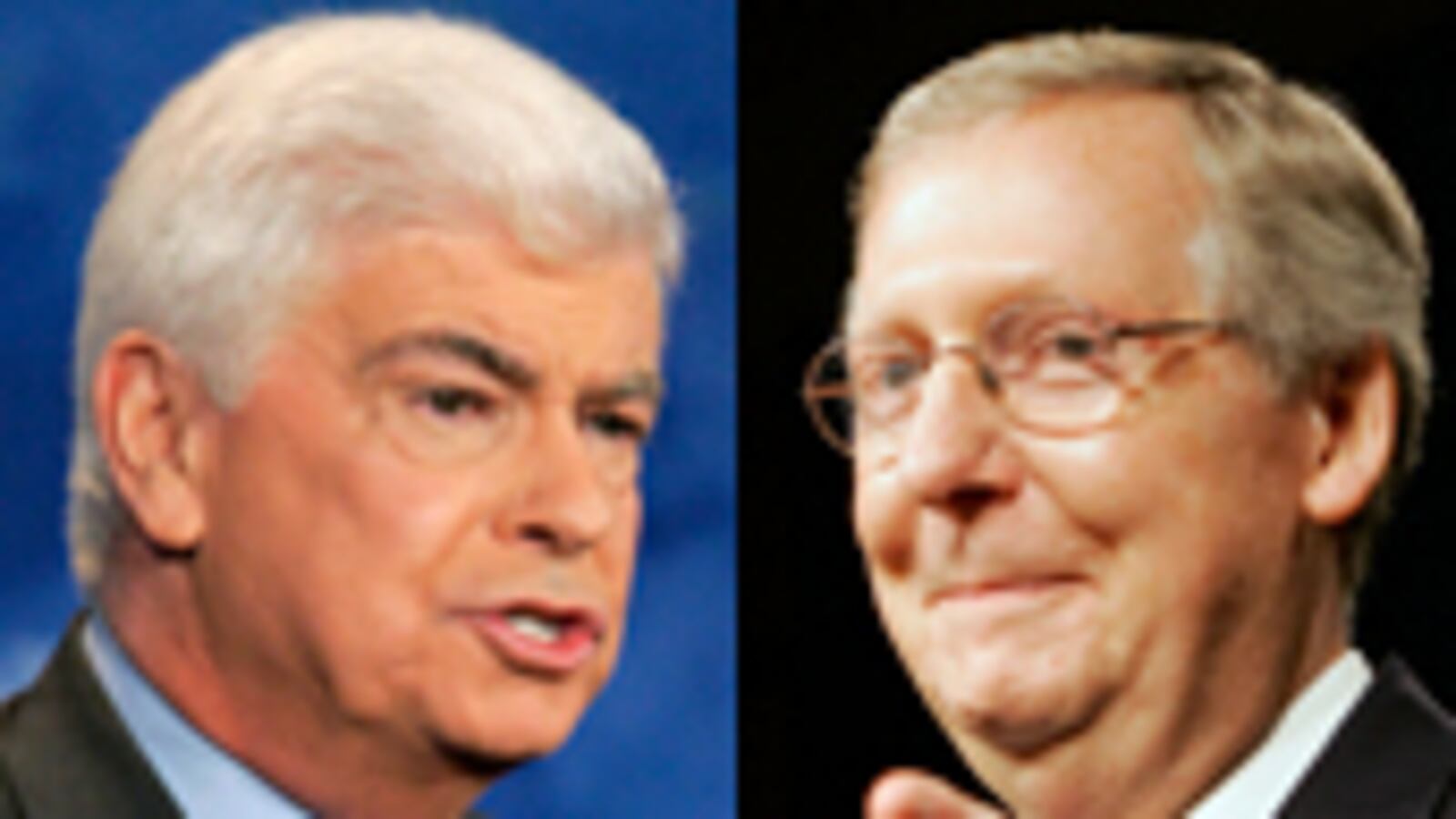
Whoever it was who defined history as “One damned thing after another” got that right. No sooner are we finished “reforming” health care than we’re about to spend the next six months debating whether to “reform” Wall Street. As another saying goes, “Send me a postcard when you get there.”
Senator Christopher Dodd of Connecticut and Senator Mitch McConnell of Wherever are going at it hammer and tong. Senator Dodd is sponsoring a bill that would—the wording is from The New York Times headline—“Curb [the] Financial Industry.” Having lost most of my shirt in the 2008 bubble, I am among the many who would rather “hang” or “shoot” Wall Street than “curb” it. But never mind.
Dodd, who these days is at pains to depict his retirement as an act of heroism and self-sacrifice, is no spotless lamb in the matter of financial irregularity. (To put it less politely: He’s corrupt.)
Senator McConnell, whose facial opacity amounts to a kind of poker-face magnificence, sallied forth to the microphones outside the White House to denounce the bill as a means of perpetuating federal bailouts of too-big financial institutions. The bill’s defenders rushed to the same microphones to proclaim that in fact, it does the exact opposite. There’s rather a lot of... swing between those two positions. The two top headlines Wednesday on Realclearpolitics.com were a study in Washington yin and yang:
“Financial Reform Bill Ends Bailouts.” Sen. Dodd
“Dodd Bill Institutionalizes Wall Street Bailouts.” Sen. McConnell
Perhaps between now and the November elections, one of these interpretations will emerge as the true one. In the meantime, as Bette Davis used to say, fasten your seatbelts. It’s going to be a bumpy summer and fall.
It was White House Chief of Staff Rahm Emanuel who came up with the defining mantra of the Obama administration, namely, “Never let a crisis go to waste.” So, having solved the health-care crisis, it’s on to this one, namely banks and hedge funds and other financial institutions that aren’t dealing from a straight deck. I wonder whether Emanuel felt that the banking system was in crisis and needed reform back in the late 1990s, when, as an investment banker, he managed to make nearly $20 million in less than two years. And having no experience at banking at all. Nice work if you can get it.
Citing Emanuel’s stunning success as a banker isn’t meant to be mere drive-by snarking. The larger point, one to bear in mind as this drama unfolds, is that most of the players in this drama are complicit. Watching Washington “reform” itself is like watching endless reruns of Casablanca, with Captain Renaud shouting that he’s shocked—shocked—gambling is going on.
Senator Dodd, who these days is at pains to depict his decision not to run for reelection as an act of heroism and self-sacrifice, is no spotless lamb in the matter of financial irregularity. (To put it less politely: He’s corrupt.) He took sweetheart mortgage deals from the grotesque Angelo Mozilo (why couldn’t he just have been named Godzilla?) of Countrywide Financial, and another sweetheart deal on an Irish cottage. His own home state’s papers call him a “lying weasel.”
The year before his heroic decision not to run for reelection, Dodd took $18,000 in campaign contributions from hedge-fund managers. That was then. Now he’s spinning the fact that he’s not running as evidence of his and his bill’s integrity.
But as Manu Raju of Politico.com points out, Dodd’s bill essentially lets hedge-fund managers off the hook by making more systematically risky firms pony up the $50 billion “liquidation fund” intended to kick in when they fail.
As for Republicans, now howling out the windows of their Lexuses that the bill will merely perpetuate bailouts and drive foreign investment away from Wall Street—are they being upfront and honest about all this? Of course not. They’re taking in campaign contributions hand over fist. But Republicans can at least be unapologetic about stuffing their pockets with Wall Street baksheesh. It’s what they do. People expect them to be on the take! (I say this as a lifelong Republican. To us, corruption is just another way of saying, “We are open for business!”) Where Democrats disappoint is when they pretend to be above bribe-taking.
With certain exceptions, such as Senator Olympia Snowe, one is left with the impression that the Republicans would rather kill the bill than suffer the ignominy of another hideous Obama legislative success between now and the November elections.
But if the Republicans succeed in blocking the bill, they may end up electing a supermajority of Democrats in November. For if the Republican message in effect amounts to “No, we must not, we cannot, we dare not regulate the thieving, manipulating swine who caused $9 trillion of your money to vanish! They’re too important to American competitiveness!”—well, whatever the nuances in the bill, it’s hard to imagine that voters won’t punish obstinacy of that order.
Meanwhile, if it the bill passes, then Democrats will own the victory—and the consequences that flow from it, just as they will soon own the consequences of health-care “reform.”
Will Wall Street become an empty canyon as the $450 trillion derivatives industry moves to Beijing and London and Tokyo and other places where people speak credit default swaps and collateral debt obligations? What will Senator Dodd have to say about that? By then he’ll be a “top Washington lobbyist,” raking in hard cash and doling out softer money to his heirs on the Hill.
Christopher Buckley's books include Supreme Courtship, The White House Mess, Thank You for Smoking, Little Green Men, and Florence of Arabia. He was chief speechwriter for Vice President George H.W. Bush, and is editor-at-large of ForbesLife magazine. His new book is Losing Mum and Pup, a memoir. Buckley's Daily Beast column is the winner of an Online Journalism Award in the category of Online Commentary.






